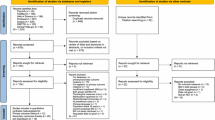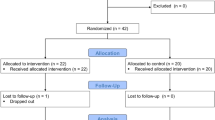Abstract
OBJECTIVE: Obesity is common in children and adolescents with incidence rates increasing both nationally and internationally. Its causes are complex and multifaceted, and obesity is associated with high morbidity and mortality as well as psychological distress. Multidimensional programmes are necessary in the treatment of this chronic disease in order to change eating and physical activity habits. A cognitive-behavioural training programme was developed and evaluated. In combination with diet and exercise, this special group programme that includes well established behavioural methods, was expected to result in long-term weight reduction and decrease of psychological distress in connection with obesity.
DESIGN: As part of the six week in-patient rehabilitation for children and adolescents at Viktoriastift in Bad Kreuznach, the three-part programme (experimental group, EG) was compared with a programme that differed only in the psychological intervention component (instead of the specific training programme they undertook muscle relaxation training, comparison group, CG).
SUBJECTS: In total, 197 children and adolescents between 9 and 19 y-of-age were recruited into the study.
MEASUREMENTS: Somatic (eg weight status), behavioural (eg eating behaviour) and psychological (eg quality of life) outcomes were assessed at five points in time: two weeks before the intervention, at the beginning and end of the programme, as well as six months and one year post-intervention. The study started in spring 1997. Main outcomes will be presented.
RESULTS: Pre- vs post-intervention-tests showed significant improvements in self-reported eating behaviours for the EG compared with the CG (F=6.38, P<0.05); these changes were independent of age and sex. The weight status measured as the percentage of overweight dependent on height was reduced in both groups immediately after the intervention and at follow-up (F=16.51, P<0.01). Reduction in the prevalence of obesity tended to be higher in the EG than in the CG (15% vs 10%). Self-reported quality of life increased from before the intervention to follow-up more in the EG than in the CG (F=3.27, P=0.08). In all, the acceptance of the behavioural patient education programme was good.
CONCLUSION: In summary, evaluation results indicate that the cognitive-behavioural training programme is a promising approach to alter obesity-related habits and to reduce somatic and psychosocial consequences. Long-term effects after two years are expected to underscore these results.
This is a preview of subscription content, access via your institution
Access options
Subscribe to this journal
Receive 12 print issues and online access
$259.00 per year
only $21.58 per issue
Buy this article
- Purchase on Springer Link
- Instant access to full article PDF
Prices may be subject to local taxes which are calculated during checkout
Similar content being viewed by others
Author information
Authors and Affiliations
Corresponding author
Rights and permissions
About this article
Cite this article
Warschburger, P., Fromme, C., Petermann, F. et al. Conceptualisation and evaluation of a cognitive-behavioural training programme for children and adolescents with obesity. Int J Obes 25 (Suppl 1), S93–S95 (2001). https://doi.org/10.1038/sj.ijo.0801708
Issue Date:
DOI: https://doi.org/10.1038/sj.ijo.0801708
Keywords
This article is cited by
-
Multiple risk factors affecting childhood psychosocial dysfunction in primary school Egyptian children
Middle East Current Psychiatry (2020)
-
The rehabilitation of children and adolescents with severe or medically complicated obesity: an ISPED expert opinion document
Eating and Weight Disorders - Studies on Anorexia, Bulimia and Obesity (2017)
-
Biopsychosozialer Ansatz der Adipositas im Kindes- und Jugendalter
Psychotherapeut (2015)
-
Psychosocial determinants of quality of life in parents of obese children seeking inpatient treatment
Quality of Life Research (2014)
-
The effect of family-based multidisciplinary cognitive behavioral treatment on health-related quality of life in childhood obesity
Quality of Life Research (2012)



